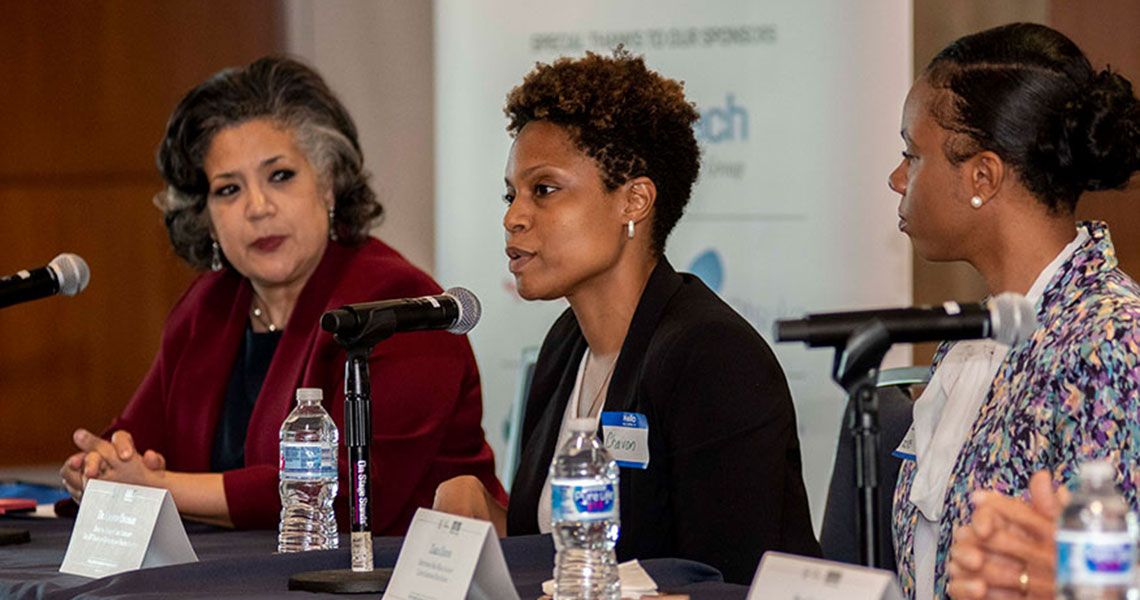To widen the pool of diversity in the health careers, it would be wise to focus attention on training and education, suggested Jehan “Gigi” El-Bayoumi, MD, RESD ’88, during the 3rd Annual Thought Leadership Summit. “We need to start way back in the pipeline and throw the net wider to identify more talent and include other health professions.”
The summit was co-hosted by the Rodham Institute at the George Washington University (GW) and BlackDoctor.org (BDO), an organization with a mission to provide health resources and information to the African American community. “It was established in conjunction with BDO’s health care gala and awards ceremony, taking advantage of the expertise of the leaders and BDO members in attendance,” said Robert Ingram, senior vice president for strategic programs and initiatives at BDO.
This year’s theme, Reclaiming Our Time, focused on the need for more people of color in the health care professions and the need for greater health equity among diverse patient populations in underserved areas.
“This is the time to synergize, catalyze, connect, and convene,” said El-Bayoumi, who serves as director of the Rodham Institute and professor of medicine at the GW School of Medicine and Health Sciences (SMHS). El-Bayoumi spoke of her experience training in Washington, D.C., and observing the population shift over time as underrepresented populations were further pushed out from the center of the city into southeast D.C. and Maryland. “We have a responsibility and obligation to uplift people and give a voice to those who are muted and voiceless.”
The summit, which reached more than 12,000 viewers on Facebook Live, featured several panel discussions, including one sponsored by GW and the Rodham Institute on increasing diversity in medical training and the overall health professions.
“Physicians are not the end all be all,” said El-Bayoumi, who moderated the panel, titled “A Better Practice: Culture and Careers in Medicine.” “We need pharmacists, physical therapist, and certified nursing assistants.”
Panelists included Chavon Onumah, MD, MPH, assistant professor of medicine at SMHS; Zakiya Edens, director of the Mass Media Academy at Calvin Coolidge Senior High School in D.C.; and Ron Carlson, executive director of the Maryland Regional Direct Services Collaborative, a partner of the Rodham Institute.
Onumah, who serves as the assistant director of the Primary Care Clerkship, shared her experience looking into how the internal medicine residency program could increase the diversity of its recruits. “I tried to look at best practices and become a change agent within my institution in advocating for more holistic reviews of applicants,” she said. “It’s not just about the scores or what schools they went to. What else are they bringing to the table?”
Guests at the summit also heard from experts on topics including the difficulties black women face communicating pain with their physicians, the perception of mental health in the black community, and increasing racial and ethnic diversity in clinical trials.
Through their discussions, the panelists shared their experiences with stigma and health inequity as patients who were not taken seriously and as caregivers who have seen patients hesitant to seek medical care out of the same fear.
Yolanda Haywood, MD, RESD ’87, BA ’81, senior associate dean for diversity and inclusion at SMHS, charged guests to go forward from the summit with at least one action item that they wanted to address as a result of their time at the event.
“We have wonderful power, energy, and creativity. There’s a lot of work to be done,” she said. “So let’s get to work.”



